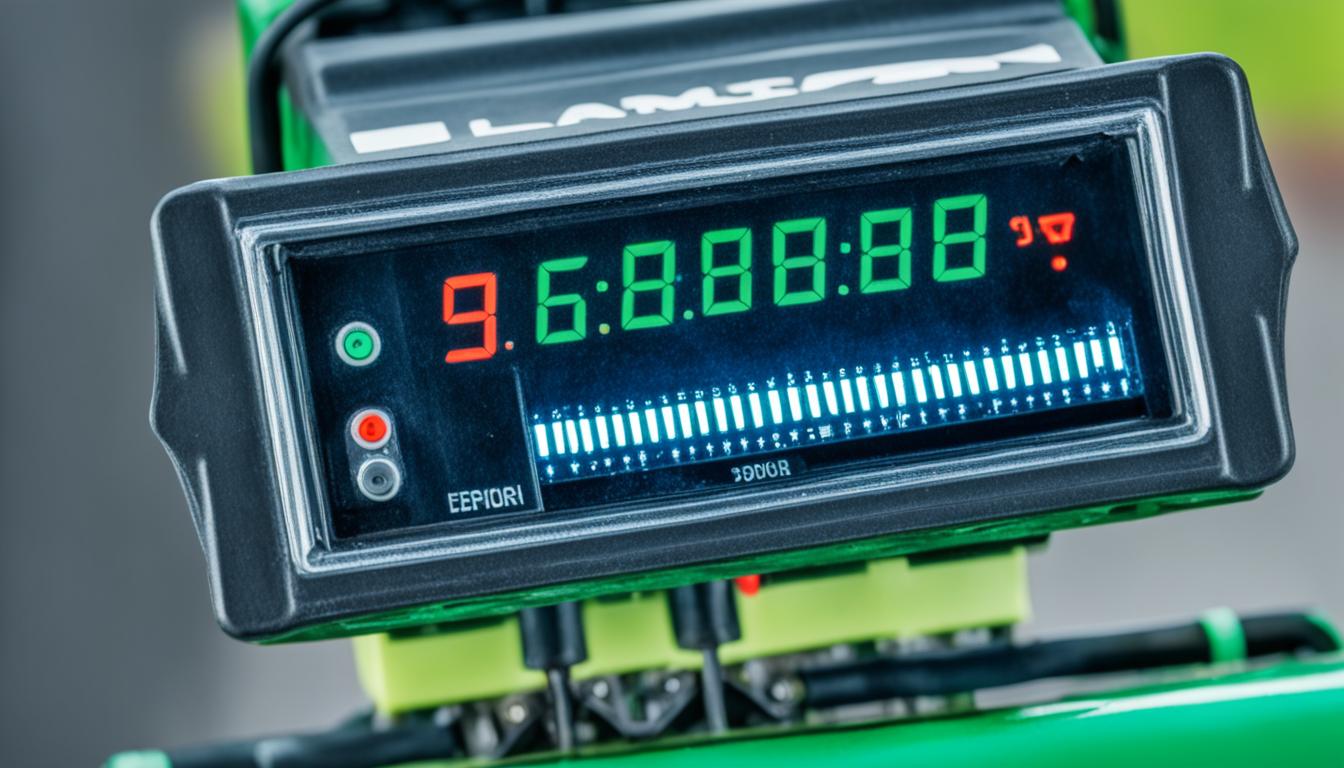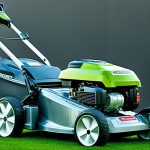When it comes to choosing a replacement battery for your lawn mower, understanding the amp capacity is essential. But how many amps does a lawn mower battery typically have? Is there a standard amp rating that applies to all mowers? Let’s uncover the mysteries surrounding lawn mower battery amps and discover what you need to know to make an informed decision.
Key Takeaways
- Understanding the amp capacity of a lawn mower battery is crucial for choosing the right replacement.
- Lawn mower batteries come in various amp ratings, depending on the specific mower model and requirements.
- Consider factors like battery type, physical parameters, voltage, capacity, and cold crank amps when selecting a compatible battery.
- Proper battery care practices, such as avoiding extreme heat and following correct charging techniques, can help prolong its lifespan.
- By delving into the specifics of lawn mower battery amps, you can ensure optimal performance and maintain a well-manicured lawn.
A Brief Overview of Lawn Mowers
Lawn mowers have evolved over time, offering a range of options to suit different needs and preferences. Understanding the various types of lawn mowers can help you make an informed decision when choosing the right one for your lawn care needs. Here’s a brief overview of the three main types:
Gas-Powered Mowers
Gas-powered mowers are known for their power and are ideal for mowing larger areas. These mowers typically feature a pull-string start and run on gasoline, offering excellent cutting performance. Gas-powered mowers are a popular choice for those with spacious lawns that require more durability and cutting strength.
Electric Mowers
If you have a smaller lawn and prefer a quieter and more environmentally-friendly option, electric mowers could be the perfect fit. Electric mowers come in two main types: corded and cordless. Corded electric mowers require an electrical outlet and provide consistent power throughout your mowing session. Cordless electric mowers, on the other hand, are battery-powered and offer more flexibility as they can be used anywhere without the need for an electrical cord.
Battery-Powered Mowers
Battery-powered mowers are a convenient option for those seeking freedom of movement without the constraints of cords or the noise of gas-powered engines. These mowers use rechargeable batteries to power their cutting blades and are cordless, providing an unrestricted mowing experience. While battery-powered mowers tend to be more expensive, they offer the convenience of easy maneuverability and are an excellent choice for smaller to medium-sized lawns.
Now that you have a better understanding of the different types of lawn mowers, you can assess your lawn care needs and make an informed decision when selecting the right mower for your specific requirements.
Comparison of Lawn Mower Types
| Mower Type | Power Source | Pros | Cons |
|---|---|---|---|
| Gas-Powered Mowers | Gasoline |
|
|
| Electric Mowers | Electricity |
|
|
| Battery-Powered Mowers | Rechargeable Battery |
|
|
Understanding Lawn Mower Batteries
Lawn mower batteries play a crucial role in starting the engine of your mower. Specifically designed as starter batteries, they provide the necessary current to kick-start your mower’s engine and get it running smoothly. These batteries are similar to car batteries in the sense that they are both lead-acid batteries, available in flooded, AGM (Absorbent Glass Mat), and gel types. However, there are some key differences between lawn mower batteries and car batteries.
While car batteries are larger and designed to power bigger engines, lawn mower batteries are built to accommodate smaller engines typically found in lawn mowers. This difference in engine size directly impacts the cranking amps provided by the batteries. Car batteries are equipped with higher cranking amps to meet the demands of larger engines, while lawn mower batteries have lower cranking amps suited for smaller engines.
Comparison between Lawn Mower Batteries and Car Batteries
| Battery Type | Lawn Mower Batteries | Car Batteries |
|---|---|---|
| Size | Smaller | Larger |
| Engine Type | Smaller engines in lawn mowers | Larger engines in cars |
| Cranking Amps | Lower cranking amps | Higher cranking amps |
Understanding the purpose and limitations of lawn mower batteries is essential when selecting the right battery for your specific mower. By considering the engine size and power requirements of your lawn mower, you can ensure that you choose a battery with the appropriate cranking amps to reliably start your mower’s engine.
Important Specifications of Lawn Mower Batteries
When choosing a replacement battery for your lawn mower, there are several important specifications to consider. Firstly, you need to decide between lead-acid or lithium batteries. Lead-acid batteries come in flooded, AGM, and gel types, while lithium batteries are becoming more popular.
It is important to understand the charging and protection methods for different battery types. Additionally, you should consider the physical parameters of the battery, such as size and terminal position.
The battery voltage is typically 12V for modern mowers. Other important specifications include capacity, represented in Ampere Hours (Ah), and Cold Crank Amps (CCA), which indicates the battery’s ability to produce current for engine startup.
When it comes to battery types, lead-acid batteries have been a long-standing choice in the industry. These batteries have different variants like flooded, AGM (Absorbent Glass Mat), and gel types. Flooded batteries are the most common type and require regular maintenance to ensure optimal performance. AGM batteries are maintenance-free and provide better resistance to vibration and shock. Gel batteries are also maintenance-free and offer better cycling capabilities.
Lithium batteries, on the other hand, are increasingly gaining popularity due to their advantages. They are lighter, have a longer lifespan, and provide better performance compared to lead-acid batteries. However, they come at a higher cost.
When considering physical parameters, it is important to choose a battery that fits properly in the battery compartment of your lawn mower. Additionally, the terminal position should match the configuration of your mower’s electrical system.
Battery voltage is an essential specification to consider. Most modern lawn mowers require a 12V battery for efficient operation. Ensure that the replacement battery matches the required voltage to avoid any compatibility issues.
The capacity of a lawn mower battery is an important factor to consider. It is represented in Ampere Hours (Ah) and indicates the amount of charge the battery can hold. Higher capacity batteries can provide longer runtimes between charges.
Cold Crank Amps (CCA) is another crucial specification to consider. It represents the battery’s ability to deliver a burst of current for engine startup in cold temperatures. Higher CCA ratings ensure reliable starting even in challenging winter conditions.
Understanding these important specifications will help you choose the right lawn mower battery that meets your specific needs and ensures optimal performance.
Choosing the Right Lawn Mower Battery
When it comes to choosing the right lawn mower battery, compatibility is key. Ensuring that the battery is compatible with your specific mower is essential to guarantee optimal performance. To determine the compatibility, there are a few steps you can follow.
Firstly, check the user manual of your lawn mower. The manual usually provides information on the recommended specifications for the battery, including voltage and CCA rating. It’s important to match these specifications to find a suitable replacement battery.
If you don’t have the manual or can’t find the information, you can also check the old battery in your lawn mower. Usually, the required specifications are printed on the battery itself. Look for the voltage and CCA rating to ensure you choose a battery with the same or similar specifications.
Another important consideration is the terminal position. The terminal refers to the connection points on the battery, and it should match the configuration of your mower. Take note of whether the terminals are on the top, side, or other position and make sure the new battery has matching terminal positions.
By understanding and determining these specifications, you can confidently select a lawn mower battery that meets the power requirements of your mower and ensures compatibility.
Lawn Mower Battery Compatibility Checklist
| Specifications | Checklist |
|---|---|
| Voltage | Match the voltage of the old battery or recommended voltage from the user manual. |
| CCA Rating | Choose a battery with a Cold Crank Amps rating matching or exceeding the CCA requirement. |
| Terminal Position | Ensure the battery’s terminal position matches your mower’s configuration. |
Amps in Battery-Powered Mowers
Battery-powered lawn mowers, particularly electric cordless mowers, are equipped with an amp rating that determines the amount of current the battery delivers to power the engine. The amp rating plays a crucial role in the mower’s performance and efficiency.
Most modern battery-powered mowers have a 12-amp engine, which provides a continuous current to drive the mower. This continuous current delivery ensures that the mower operates smoothly and efficiently, allowing users to complete their lawn care tasks with ease.
For most home users, a 12-amp engine is sufficient to handle typical mowing requirements. It offers a balance between power and battery life, ensuring that the mower operates optimally without draining the battery too quickly.
Understanding Amps, Volts, and Battery Ratings
Amps, volts, and watts are fundamental units used to measure electricity. It’s essential to comprehend their significance when assessing battery ratings for lawn mowers. Amps measure the amount of electrical current flowing through a circuit, while volts quantify the electrical potential difference or voltage. Watts, on the other hand, represent power, which is calculated by multiplying the amps and volts together.
By understanding the relationship between amps and volts, you can make informed decisions about battery compatibility for your lawn mower. For instance, when selecting a replacement battery, it’s crucial to consider both the amp capacity and voltage to ensure seamless integration with your mower’s electrical needs.
Take, for example, an electric lawn mower with a 12-volt battery. The amp capacity of the battery determines the amount of current it can supply to power the mower. A higher amp capacity translates to a longer runtime and greater power output.
It’s worth noting that the relationship between amps and volts can be illustrated using watts. Watts represent the total power consumed or delivered by an electrical device. The formula for calculating watts is simple: watts = volts x amps. This equation highlights the direct relationship between amps, volts, and power.
“Understanding the relationship between amps and volts is crucial for selecting the right battery for your lawn mower. By considering both the amp capacity and voltage, you can ensure compatibility and optimize performance.”
Comparison of Amps, Volts, and Watts
| Unit | Definition | Symbol |
|---|---|---|
| Amps | Measure of electrical current | A |
| Volts | Measure of electrical potential | V |
| Watts | Measure of electrical power | W |
The provided table offers a concise comparison of amps, volts, and watts, summarizing their definitions and corresponding symbols.
Visual representation plays a vital role in understanding complex concepts. The image above illustrates the relationship between amps, volts, and battery ratings, further enhancing your understanding of these electrical units.
Tips for Prolonging Battery Life
Proper care and maintenance of your lawn mower battery are essential for maximizing its lifespan and ensuring reliable performance. Follow these tips to prolong the life of your battery:
Avoid Excessive Heat
Exposing your battery to extreme heat can significantly affect its performance and shorten its lifespan. High temperatures can cause the battery to lose its charge quickly and reduce its overall capacity. To protect your battery, store it in a cool and dry place, away from direct sunlight or sources of heat.
Follow Proper Charging Techniques
Using the correct charger and following the recommended charging procedures can help extend the life of your battery. Ensure that you use a charger specifically designed for your lawn mower battery to avoid overcharging or undercharging. Monitor the charging process closely and disconnect the charger as soon as the battery reaches a full charge.
Avoid Complete Discharge
It is advisable to avoid completely discharging your lawn mower battery whenever possible. Regularly charging the battery before it reaches a critically low level helps maintain its health and prevents deep discharge cycles. Deep discharges can damage the battery cells and significantly reduce its lifespan.
“Proper care and maintenance of your lawn mower battery are essential for maximizing its lifespan and ensuring reliable performance.”
By following these battery care tips, you can ensure that your lawn mower battery remains in optimal condition and provides consistent power for your mowing needs.
| Battery Care Tips |
|---|
| Avoid excessive heat |
| Follow proper charging techniques |
| Avoid complete discharge |
Conclusion
In conclusion, understanding the amp capacity of a lawn mower battery is crucial when selecting a replacement and ensuring optimal performance for your mower. By considering factors such as the battery type, physical parameters, voltage, capacity, and cold crank amps, you can find a compatible battery that meets your needs.
It is also important to follow proper battery care practices to prolong the lifespan and maintain the performance of your lawn mower battery. Avoid exposing the battery to extreme heat, use the correct charger during charging, and prevent complete discharge of the battery to ensure its longevity.
With the information provided in this guide, you now have the knowledge and confidence to choose the right lawn mower battery for your lawn care needs. Whether you opt for a lead-acid or lithium battery, understanding the amp capacity and considering the necessary specifications will help you make an informed decision.
Remember, selecting the right lawn mower battery is essential for a smooth and uninterrupted mowing experience. By following the guidelines outlined in this guide and taking proper care of your battery, you can ensure efficient performance and enjoy a well-maintained lawn for years to come.





